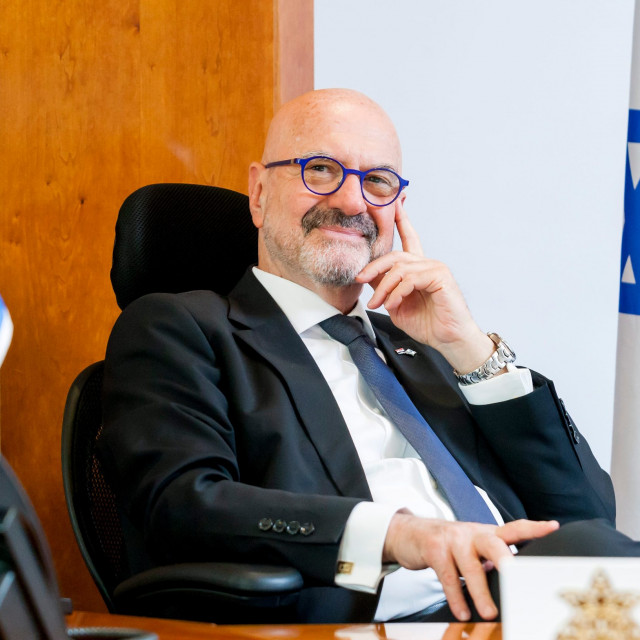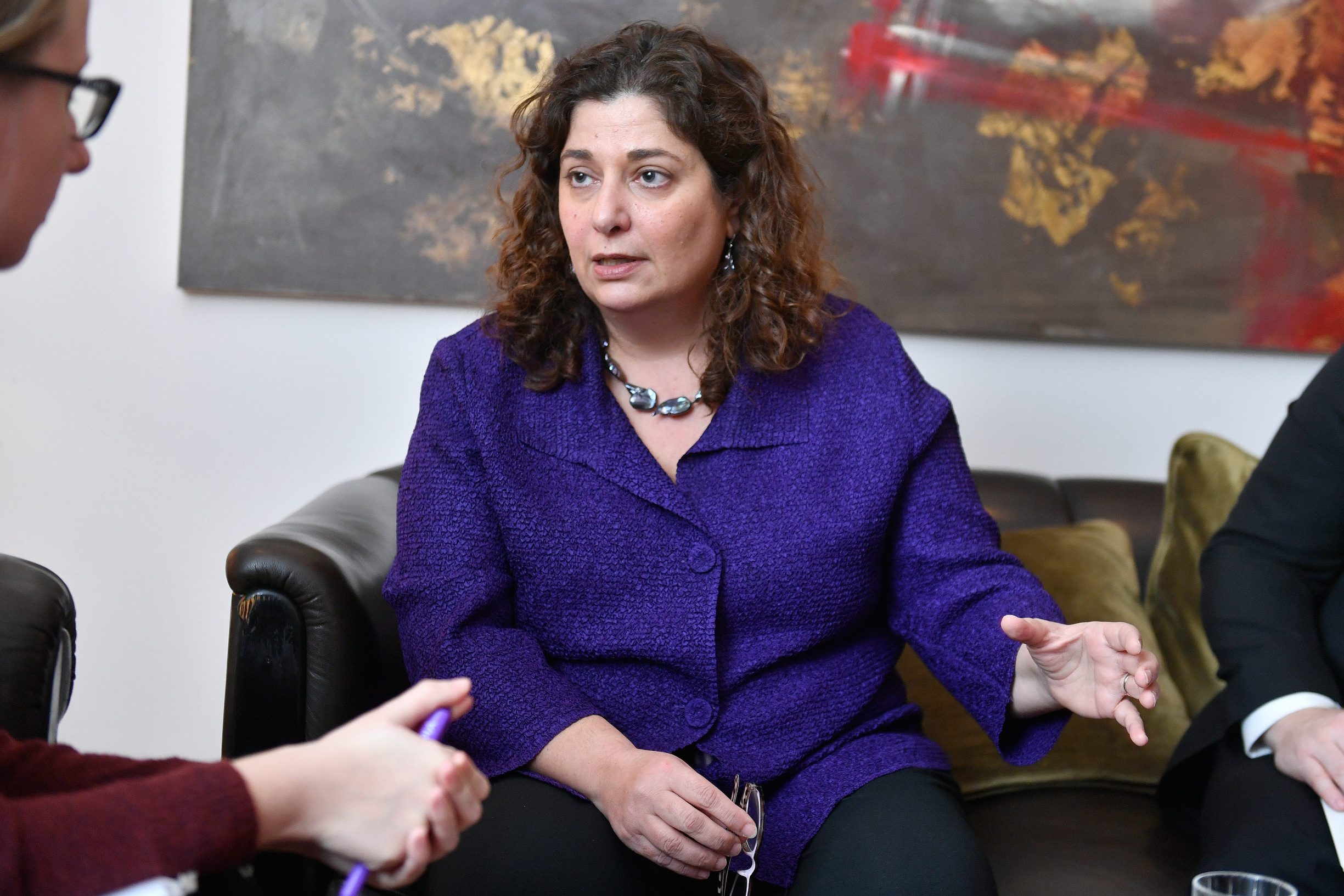
What is the reason of your visit to Zagreb?
I had a very close touch with US embassy here and we decide that this moment, when Croatia will preside over EU Council, it is the perfect timing to get here and have meetings. This is the perfect moment to establish a relationship with Croatia over holocaust issues. I met with the minister of culture, Nina Obuljen Koržinek, and we discussed the issues relating to the Jewish cultural legacy and the Holocaust. Separately, I met with members of Jewish organizations in Croatia and with state secretaries at the Ministries of foreign affairs and justice .
I also went to Jasenovac and met with the director. It was fascinating. I have not been to Jasenovac since 1997.
How was the experience now and what has changed since then?
When I was here, there was only the flower monument and not many texts. It's different to see just the monument and to see the whole museum with tour and narrative texts. To go now, after the museum opened, and to go deep into these issues was interesting.
I saw for the first time the structure and the depth of the tragedy in a way you can not see if you are standing outside in front of the monument. I'm a visual learner and to see slide by side the whole tragedy and all of the 83811 names, and to connect to those people, it was very moving. Totally different than my first visit. This is an experience that will stay with me. I was really moved by the exhibit. They did it very professional but also modernize it and kept the museum current by developing new technologies and connecting with international and Croatian scholars. It pushed the museum to the next level and increased the visiting. If you have such a meaningful story, you have to learn about it. If you don't study about holocaust, you risk happening it in the future. Teaching the lessons of the holocaust is very important. They made a good foundation and the next step is with the Ministry of culture to bring more students. Make it present so students can ask questions and interact with iPads. It's important to know why it happened, what can we learn from it and how can we make it not to happen again.
One of the issues regarding Jasenovac is two commemorations, one of Croatian government and second of Jewish organizations. What is the stance of special envoy on this issue?
My hope for Croatia is that it will come to a place where the government and these groups come to a community and if they can, one of understanding, with open dialogue. If the doors are open to dialogue than there is a constructive response and feedback given to this groups, than perhaps maybe then it can be a different outcome. It's to the government to see how to frame this dialogue and to initiate it so that commemoration will be meaningful and that victims groups will feel respected. I think this happened because in this country the sense of historic revisionism is too present and hasn't been condemned fast enough. My hope would be the government to take seriously this concern the reflection of historic revisionism is on the rise. International report said it's on the rise and so if that can be addressed between now and April in open dialogue which has two directions, then the outcome may be more meaningful commemoration.
What about the saying “Za dom spremni” (used by Ustasha during World War II). Should it be banned?
I think that statement is the throwback to past and Croatia should move beyond that. Certainly, freedom of speech is still here and I cannot talk about banning it because Croatia have legal framework, but statement like that shouldn't have a place in modern Croatian. Because of our first amendment, we can't banned the speech, but we have different laws in our country I and do not want to tell Croatia how to handle this situation. All I'm saying is that from a moral point of view, there is a place where someone can use that, and their intentions can be against another person. It doesn't speak about inclusion and equality so there really isn't a place like that in Croatia.
One of Croatian presidential candidate, Miroslav Škoro, said that he want to dig up Jasenovac and count the victims. Later, he said that was montage and he said he wanted to open up the archives. How important is to know the number of victims?
It is important to know the number of victims and each year that goes by, new information comes out. There is online website where all the new, additional information is set up. So there is no secret about Jasenovac, there should be no myths, no weaponizing of holocaust data. The data is fact and the people in the museum are the experts. Let the international experts looks up the archives and let them find each day by day. This is historical fact. There is no need to exaggerate, tragedy is enough as it is and we stand behind, the USA government stand behind the estimates that are under US holocaust memorial museum and encyclopedia that are updated as the new information are available. I think there is no mystery and no mythology about it.
There are talks in Serbia that the real number is around 700 000?
The number so far is 83811 and I personally don't find the place for 700 000 and I think the people should stand behind international holocaust historians and not stand behind other numbers. The numbers should be put together between Croatian and international scholars. It was really important to hear from minister of culture when they said they are working with different holocaust museums around the world and they will have a conference in March in bringing together historians from the region. That is the path forward. To open the archives, to look up the facts, to update the knowledge and not to trivialize the people with some other numbers.
Historians should work together to come up with scholarship because holocaust is important enough to not let people to come up with their own theories. It is a historical fact. It Happened in Croatia, it happened in Europe.
Have you been monitoring the progress of restitution of Jewish property in Croatia?
Croatia in 2009. endorsed the Terezin declaration and one of the things from this declaration is to investigate restitution of Jewish property. I came here to seek progress beyond what was done until 2009. We owe the victims of Holocaust the better outcome to preserve memory by restituting holocaust area property, property that was taken by them. I believe that it was good that Croatian government received me and hope there will be progress after our meeting. There is room for more to be done. Also, under Just Act, we have to file a report on situation over restitution of Jewish property in every country. Report is due very soon and this is the theme for many countries.
Report is not yet done?
Not yet done, but hopefully it will be in few weeks.
The report is due 10 years after the Terezin declaration. Why now?
The reason for this is because the Holocaust generation is passing with every year. They are now in their 90's, this generation is passing. And while this generation is still living, they need healthcare. Issue of restitution under the Terezin declaration was to do something speedily, not through along drown-out process that could take dozens of more years but to actually finish, to make settlements while the survivors is still living and to honor their memory. Report is covering 46 countries and I hope that the scholarships that will be covering this report will see what other countries have done. I hope everyone will see what other countries had done. There is no one solution that fits to all.
How will the report be used excatly?
I cant speak for the Congress but I think they wanted for the people to have the tool for understanding of restitution practice, policy and mechanisms in every single country. Hopefully the survivors and their heirs will find the resources to achieve justice in their lifetime. Our job was to produce it and that’s what we are doing. I don't know what it will be used for.
Can you compare Croatia with other countries?
I would not compare countries, I would rather for people to read all the reports from different countries and find information about legislations, mechanisms, claims processes in all the different countries. Report should say what some countries has done and what is left to do. I think many countries will find there could still be better thing to done.
What about heirless property?
Just Act covers private property, communal property or religious property and heirless property. I think there is a lot of work still to be done about heirless property and there have not be done a lot of progress since the Terezin declaration.
There have been controversy about the Holocaust memorial in Zagreb because of the name. It's called “Memorial to victims of Holocaust” and not “Memorial to victims of Holocaust in Croatia”?
I have heard about this but I don't have anything concrete to say about it because I haven't see the narrative text. I think it's very important that, if it has a text, what the text will say. I hope that the people who are doing this sculpture are having a communication with jewish communities about this. I hope such program would have a dialogue with Croatia Jews and that Croatian Jews will feel included in this story.
What will be your main missions as special envoy?
I think it will be more continuity than change. I think my predecessor did tremendeous progress in negotiating settlements in different countries in restitution and holocaust commemoration. He worked to help countries to move further to new commemoration and new memorials. Some countries haven't still even marked the site that holocaust took place in their country. I think he achieved a lot and my goal is to continue to communicate with countries and reach the settlements. Also, I would like to advance holocaust education because it is even more important as the last surviving generation passes. If you don't have the education, your are not honoring their legacy and risks of happening again.
In Europe and America we are witnessing the rise in antisemitism?
In general, antisemitism is rising and we are concerned because its rising in Europe and in United States and we should take it very seriously. Countries should work together in partnership to combat it. It can't just be the words. It should be to social and government leaders to condemns such acts and to stand in solidarity with victims of such hate crimes and hate speech.






Komentari
0